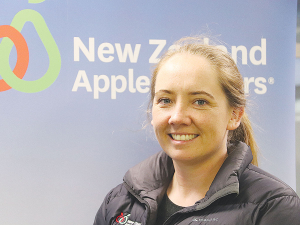New Zealand apple and pear harvest 2026 signals standout season
Early forecasts for New Zealand's apples and pears point to a standout season marked by exceptional fruit quality and high pack-out rates.
 NZ Apples and Pears market access manager Danielle Adsett says the expected lower apple crop is being carefully managed.
NZ Apples and Pears market access manager Danielle Adsett says the expected lower apple crop is being carefully managed.
Sixty five percent of NZ's apple crop is grown in Hawke's Bay and 4,000 hectares - or about half the total crop grown in the region - has been affected by Cyclone Gabrielle.
NZ Apples and Pears market access manager Danielle Adsett told Hort News, while her organisation is not involved in the marketing of apples, it's been assured by exporters that the expected lower crop is being carefully managed.
NZ apples are sold to almost 70 countries around the world - with China being our largest market. However, only 13% of NZ's total crops is sold there. Vietnam has, in a matter of years, risen from 13th to become our 3rd largest market.
Adsett says Asia is obviously a focus for NZ as the middle class in those countries grows. Taiwan and Japan are also up-and-coming markets.
"The fact is that NZ produces the best apples in the world because of our growing systems and climate," she told Hort News. "As such, we are able to offer a premium product."
Adsett says, in sustainability terms, NZ has already done an awful lot but hasn't really told the story about our low carbon footprint and our quality orchard management practices. She says, on a per hectare basis, the NZ apple sector is highly productive compared with others.
She adds the other big change is the image of the sector and how it's portrayed.
"Many people perceive it to be a manual labour industry with a focus on picking and pruning trees. But this is so far from the truth," says Adsett.
"The job has definitely changed and we have seen that in the orchards and the packhouses. We have stories about some of our members bringing in people from the job seeker benefit into their packhouse who are now running their multi-million dollar technology."
She says the industry has absolutely changed and is all about technology and exciting innovation, with great jobs on offer.
Adsett concedes that while many people are trying to be optimistic about the future, the reality for many is heartbreaking.
"Trees remain covered in silt; the ground is wet and people are doing their best to support each other in very difficult times."
Budou are being picked now in Bridge Pā, the most intense and exciting time of the year for the Greencollar team – and the harvest of the finest eating grapes is weeks earlier than expected.
The Real Estate Institute of New Zealand (REINZ) has released its latest rural property report, providing a detailed view of New Zealand’s rural real estate market for the 12 months ending December 2025.
Rural retailer Farmlands has released it's latest round of half-year results, labeling it as evidence that its five-year strategy is delivering on financial performance and better value for members.
OPINION: "We are back to where we were a year ago," according to a leading banking analyst in the UK, referring to US president Donald Trump's latest imposition of a global 10% tariff on all exports into the US.
DairyNZ says the Government’s proposed Resource Management Act reform needs further work to ensure it delivers on its intent.
Overseas Trade Minister Todd McClay says he's working constructively with the Labour Party in the hope they will endorse the free trade agreement (FTA) with India when the agreement comes before Parliament for ratification.

OPINION: A mate of yours truly reckons rural Manawatu families are the latest to suffer under what he calls the…
OPINION: If old Winston Peters thinks building trade relations with new nations, such as India, isn't a necessary investment in…